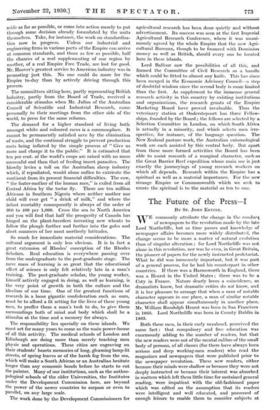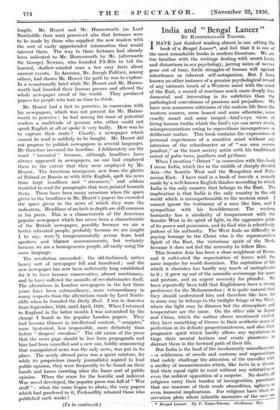The Future of the Press—I
By ST. JOHN ERVINTE.
-1-ATE commonly attribute the change in the conduct
V / of newspapers to the revolution made by the late Lord Northcliffe, but as time passes and knowledge of newspaper affairs becomes more widely distributed, the change seems to be more a matter of natural evolution than of singular alteration ; for Lord Northcliffe was not alone in this revolution, nor was he even, in Great Britain, the pioneer of papers for the newly instructed proletariat. What he did was immensely important, but it was part of a general process, for he had his counterpart in other countries. If there was a Harmsworth in England, there was a Hearst in the United States ; there was to be a Coty in France. Nature dearly loves a coincidence, as dramatists know, but • dramatic critics do not know, and it is her pleasure to arrange that when a man of notable character appears in one place, a man of similar notable character shall appear simultaneously in another place. Mr. William Randolph Hearst was born in San Francisco in 1863. Lord Northcliffe was born in County Dublin in 1865.
Both these men, in their early manhood, perceived the same fact : that compulsory and free education was enormously adding to the number of readers, but that the new readers were not of the mental calibre of the small body of persons, of all classes (for there have always been serious and deep working-men readers) who read the magazines and newspapers that were published prior to the newspaper revolution. These new readers, either because their minds were shallow or because they were not deeply instructed or because their interest was absorbed in matters which left them little time for sustained general reading, were impatient with the old-fashioned paper which was edited on the assumption that its readers were intelligent and well educated, and possessed of enough leisure to enable them to consider subjects at length. Mr. Hearst and Mr. Harmsworth (as Lord Northcliffe then was) perceived also that fortunes were to be made by those who supplied the new readers with the sort of easily apprehended information that would interest them. The way to these fortunes had already
been indicated to Mr. Harmsworth by Mr. (afterwards Sir George) Newnes, who founded Tit-Bits to tell the hurried, shallow-minded man a few easy facts about current events. In America, Mr. Joseph Pulitzer, among others, had shown Mr. Hearst the path he was to explore. In a sensationally brief while Mr. Hearst and Mr. Harms- worth had founded their famous presses and altered the whole newspaper creed of the world. They produced papers for people who had no time to think.
Mr. Hearst had a fact to perceive, in connexion with his newspapers, which was not present for Mr. Harms- worth to perceive : he had among his mass of potential readers a multitude of persons who either could not speak English at all or spoke it very badly. How was he to capture their cents ? Clearly, a newspaper which cannot be read is unlikely to be bought. Mr. Hearst did not propose to publish newspapers in several languages. He therefore invented the headline. I deliberately use the word " invented " because, although headlines have always appeared in newspapers, no one had employed them to the extent that they were employed by Mr. Hearst. The American immigrant, new from the ghetto of Poland or Russia or with little English, spelt his news from large headlines and " streamers," and seldom troubled to read the paragraphs that were printed beneath them. There have been many occasions when the space given to the headlines in Mr. Hearst's papers far exceeded the space given to the news of which they were the indicators, Headlines of an inch in depth are still common in his press. This is a characteristic of the American popular newspaper which has never been a characteristic of the British newspaper, possibly because we are a better educated people, probably. because we are (ought I to say, were ?) temperamentally averse from loud speakers and blatant announcements, but certainly because we arc a homogeneous people, all easily using the same language.
The revolution succeeded : the old-fashioned, rather heavy sort of newspaper fell and foundered ; and the new newspaper has now been sufficiently long established for it to have become conservative, almost reactionary, and to have suffered the assaults of revolutionaries itself. The alterations in London newspapers in the last three years have been extraordinary, more extraordinary in many respects than the alterations made by Lord North- cliffe when he founded the Daily Mail. I was in America from September, 1928, until April, 1929. When I returned to England in the latter month I was astonished by the change I found in the popular London papers. They had become thinner in intellectual content, " snappier," more hysterical, less responsible, more definitely than before " drapers' circulars." The old canon of the press that the news page should be free from propaganda and bias had been cancelled and a new one, boldly announcing that manipulated news was the only news, was put in its place. The newly altered press was a queer mixture, for while its proprietors (rarely journalists) aspired to lead public opinion, they were frequently to be found on their hands and knees crawling after the baser sort of public opinion. When the craze for the horrific and indecent War novel developed, the popular press was full of " War stuff " : when the craze began to abate, the very papers which had pandered to it, Pecksniffily rebuked those who published such works
(To be continued.) -



















































































 Previous page
Previous page